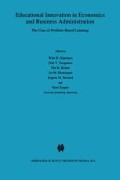Abstract
Institutions in higher education have come under increasing pressure to change their instructional practices. As a matter of fact, the implementation of innovative programmes is not without problems. These difficulties are caused by different factors: first of all on the institutional level. Higher education is having a unique organisational structure: the inherent conflict between teaching and research (Locke, 1984). Kozma (1985) points out that academic organisations are characterised by their inability to strike a satisfactory balance between the requirements for individual autonomy and academic freedom on the one hand, and the necessity for organisational efficiency, accountability and control on the other hand. Dependence on a variety of personal preferences of instructors leads to unclear choices in decision processes. Innovations outreaching the level of individual instructors are particularly vulnerable for failure and resistance to change. A second explanation is given from an educational viewpoint: new educational practices are based on past practices. Whenever instructors employ new teaching methods, these methods are embedded in earlier teaching experiences (Bosch, van den & Gijselaers, 1993). Duffee and Aikenhead (1992) found in their research that the teacher is the most influential factor in educational change. They argue that teachers use their own so-called ‘practical knowledge’ to make decisions on all aspects of teaching. In the context of curriculum innovation three components of teacher practical knowledge appear to be important: teachers’ past experiences (including formal education), teachers’ current teaching situation and the teachers’ visions of what teaching should be like. This teacher practical knowledge is strongly influenced by personal beliefs and values that are quite often deeply rooted and therefore resistant to change.
Access this chapter
Tax calculation will be finalised at checkout
Purchases are for personal use only
Preview
Unable to display preview. Download preview PDF.
References
Bosch, H. van der & Gijselaers, W. (1993). The introduction of problem based learning in the faculty of Policy and Administrative Sciences: a management approach. In E. de Graaff & P. Bouhuys. Implementation of Problem-Based Learning in Higher Education. Amsterdam: Thesis Publishers.
Boud, D. & Feletti, G. (Ed.) (1991). The challenge of Problem Based Learning. London: Kogan Page.
Duffee, L. & Aikenhead, G. (1992). Curriculum change, Student evaluation and Teacher practical knowledge. Science Education, 76, 493–506.
Kokx, I., & Schmidt, H. (1993). Het perspectief van docenten op probleem gestuurd onderwijs. Maastricht, interne publicatie Faculteit der Gezondheidswetenschappen.
Kozma, R. B. (1985). A grounded theory of instructional innovation in higher education. Journal of Higher Education, 56, 300–319.
Locke, E. A., Fitzpatrick, W., & White, F (1984). Job satisfaction and role clarity among university and college faculty. In Bess, J. L. (Ed.), College and University Organization. New York: University Press.
Schmidt, H. G. & de Voider, M. L. (Eds.) (1984). Tutorials in Problem Based Learning. A new direction in teaching the health Professions. Assen: Van Gorcum.
Author information
Authors and Affiliations
Editor information
Editors and Affiliations
Rights and permissions
Copyright information
© 1995 Springer Science+Business Media Dordrecht
About this chapter
Cite this chapter
Hommes, J. (1995). Do Staff Members Appreciate The Problem Based Learning Approach?. In: Gijselaers, W.H., Tempelaar, D.T., Keizer, P.K., Blommaert, J.M., Bernard, E.M., Kasper, H. (eds) Educational Innovation in Economics and Business Administration. Educational Innovation in Economics and Business, vol 1. Springer, Dordrecht. https://doi.org/10.1007/978-94-015-8545-3_42
Download citation
DOI: https://doi.org/10.1007/978-94-015-8545-3_42
Publisher Name: Springer, Dordrecht
Print ISBN: 978-90-481-4504-1
Online ISBN: 978-94-015-8545-3
eBook Packages: Springer Book Archive

